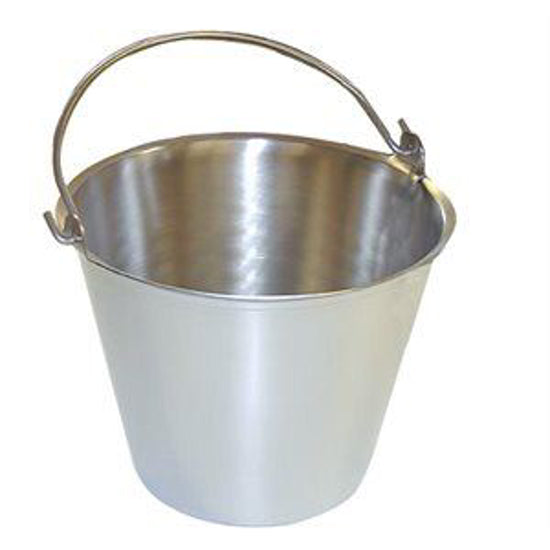
Stainless Steel Pails are heavy one-piece seamless construction throughout. Made of 18-8 Type 304 stainless steel, the seamless construction assures greater tensile strength. With mirror polish outside surface and satin finish inside, our Pails are easily cleaned to the most exacting standards.
Instructions for Care and Use of a Stainless
Steel Pail Our line of stainless steel pails are made from type 304 and type
316 stainless steel. The raw material we use is certified by the steel mills to
contain the proper amounts of chromium and nickel to insure that the material
is in fact, stainless. The word stainless, refers that the steel is corrosion
resistant. This means that this alloy will not rust, pit or corrode as easily
or quickly as plain or mild steel if the surface is properly conditioned and
maintained. Our pails are highly polished on the outside and satin finished on
the inside. All pits or cavities are removed from these surfaces which might
rap moisture or bacteria. This should be the condition of the pail when you
receive it. If it is not, we want you to inform us the day you receive our
product. If you remember a few basic things when using your stainless steel
pail you will have many years of useful service from our products. 1. Rinse or
wash out the pail after each use. If caustic liquids or hard water have been in
contact with the pail, also thoroughly dry the pail before storing. The reason
is this: Free iron in hard water or residue of caustic powders etc. will
combine with small droplets of moisture to form a solution that will corrode or
pit stainless steel. Once a pit has started it becomes deeper and deeper as
more moisture is trapped in this cavity. Eventually the pit will produce a hole
through the wall of the pail. 2. Certain detergents will corrode stainless
steel, particularly ones which have a chemical added to give a pleasant scent.
Be careful that you have thoroughly rinsed out and dried the pail so as to
leave no residue of the detergent. 3. Do not use an iron scouring pad to scrub
the pail. Iron will be transferred to the pail, and, combine with residue
moisture, will corrode the pail. Use only a stainless steel scouring pad to
clean a stainless surface. 4. Use only stainless steel items with your
stainless steel pail. A mild steel strainer, stir or other utensil used or
stored in contact with your pail can create an environment where corrosion can
begin. 5. Inspect your pail regularly to detect any pitting. By polishing the
surface you can often remove or change the pit to a shallow depression that
will stop the corrosion. We hope that these suggestions will help you achieve
the maximum useful life out of your stainless steel pail.
